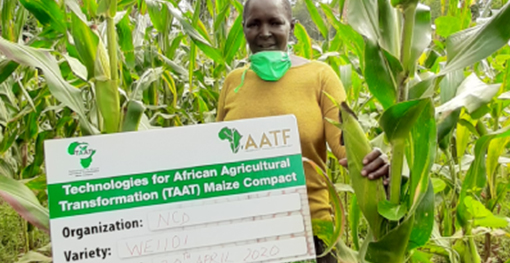- by J.Muthie
Maize farming was becoming a source of major frustration for Ann Aloo, a smallholder farmer in Kisumu County of Kenya. For her, growing maize in the semi-arid western Kenya region has been hectic due to unpredictable weather and inaccessible climate-smart farm inputs.
For a long time, the farmer says she could only harvest 135 kilos of maize from her quarter acre farm, until late last year when DroughtTEGO maize, a water-efficient maize variety that is suitable for her area, was introduced to her. Now she can harvest at least seven 90 kg bags (630kgs) from the same piece of land after harvest in January this year following a short rainfall late last year.
Aloo’s situation mirrors that of Ben Wamukhuna from the neighbouring Kakamega County. Wamukhuna says he used to produce at least two 90 Kg bags per quarter acre, translating to 180 kgs. Currently, the same piece of land produces about eight 90 kg bags with DroughtTEGO maize varieties, giving him 720kgs in total.
Aloo and Wamukhuna are among nearly 2,000 farmers in the Western Kenya region who received over 10 tons of climate-smart maize seeds varieties for farm demonstrations at the beginning of this year.
The farmers say they prefer the DroughtTEGO maize over other varieties for its early maturity, high yielding, and large cobs.
Paul Wabomba, a farmer in Bungoma County Western Kenya, says that even though they received the inputs late and planted a little past the desired time, the DroughtTEGO varieties matured faster with high yields compared to other varieties planted within the same agro-ecological zone.
“The DroughtTEGO maize varieties were near harvesting while the other varieties had not matured yet for harvest despite having been planted earlier,” says Wabomba.
About 95 demonstration plots were established in the region to showcase TAAT Maize technology package which included improved climate-smart hybrids, blended NPK planting fertilizer with added micronutrients, optimal planting density, and Fall armyworm (FAW) management practices.
To boost productivity and incomes and sustain the livelihoods of farmers like Aloo and Wamukhuna, adoption of good farming practices and facilitation of access to and uptake of new high-yielding, drought- and disease-resistant varieties are essential.
While 1, 935 farmers received and planted the climate-smart seeds on their demonstration plots, the COVID-19 outbreak caused a big upset at the onset of the planned activities due to travel and other restrictions that affected movement and gatherings.
The outbreak-related restrictions denied farmers timely access to farm inputs while agro-dealers saw a decline in supplies from seed companies. Although the Kenyan government stepped in and developed protocols for agricultural value chains to continue with business to avoid a food crisis, the confusion had already impacted the planting season.
The AATF TAAT team that needed to carry out monitoring and evaluation of the project progress in the field was not spared the loss of time due to the restrictions on the receipt of travel authorization from the AATF Risk Management Committee to conduct a limited evaluation of the project.
In August, the team went ahead to distribute complementary inputs such as appropriate fertilizer blends and FAW control technologies which ensured farmers got optimal maize yields.
To save time, the team worked closely with the farmer group leaders to oversee seed distribution, field selection, and establishment of demonstration plots among other activities. In addition, farmers who interacted with the TAAT team stated that the Striga and FAW are still issues of concern to their maize productivity in many parts of Western Kenya.
Despite the challenges brought about by the pandemic, AATF ensured farmers received seed inputs during the COVID-19 period.
Feedback from farmers was that the DroughTEGO seeds that are usually delivered in 50kg bags, be repackaged into smaller bags as it is hectic and expensive to farmer groups to repackage into 3kg bags.
Further, the farmers requested AATF to link them with seed companies and agro-dealers that produce these varieties to ensure they are distributed within the localities.
The objective of the TAAT Maize Compact is to disseminate and facilitate the rapid adoption of water-efficient and climate-smart maize technologies such as the Water Efficient Maize Varieties from the WEMA project across 14 target countries in Africa. The project aims at reaching more than 2,000,000 farmers across 14 African countries. Here is the Link to the project page.



















































































